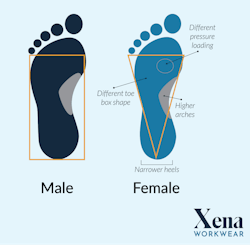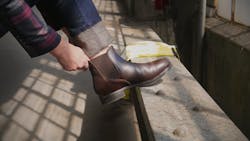Lack of Women’s PPE Causes Safety Issues. Is Anything Being Done?
Ana Kraft was frustrated: frustrated that although she kept several pairs of safety boots under her desk, none of them fit; frustrated that she was constantly having to change her shoes at work -- problems which her male colleagues didn’t face.
After finishing her degree, Kraft had found the “perfect job” working on massive manufacturing projects for a consulting company. Part of her job was to lead multimillion-dollar project planning sessions.
“I was typically the only woman in the room with 10 to 20 engineers, and I was required to dress professionally for those meetings,” she says. “Every time the meeting wrapped up, one of the guys would say, ‘Let’s go out on the shop floor to check on the project we just discussed,’ and I had to hold up the whole room and say, ‘Wait, guys! I have to run back to my desk and put on my safety boots.’”
Once her safety boots were on, Kraft didn’t feel protected or comfortable.
“Every time I walked across the manufacturing floor, my safety boots felt more like a safety hazard than actually protecting me because they were so clunky. I never could get the right fit.”
Not Just a Manufacturing Problem
From Firehouse, a publication also owned by IndustryWeek parent company Endeavor Business Media: Gear that Fits Pushed by Women Firefighters in Los Angeles County, CA
“Women were wearing men’s uniforms, and they never really fit properly. Plus, not having female options made them feel like they weren’t part of the group.” she says. “Our uniforms are very personal items, so it was important that our female employees felt seen and heard.”
Rodriguez discovered the request was not so simple. That’s a problem.
Not only does ill-fitting PPE put women employees at risk, but for an industry struggling to find workers, it sends a less-than-welcoming message to a category of workers that often has been overlooked. Fortunately, times are changing, and manufacturers are stepping in to fill the gap.
Shrink It and Pink It
After learning her female colleagues also disliked their safety boots, Kraft did research and discovered what is known as the “shrink it and pink it” concept in product design “where traditional manufacturers take a men’s product, in this case safety boots, make it smaller and make it pink or purple,” she says. “And that’s not what professional women want.”
Not only can the “shrink it and pink it” phenomenon be insulting to women, in an industrial context, it can be dangerous. According to a 2022 report, “Canadian Women’s Experiences with Personal Protective Equipment in the Workplace,” over half of the survey respondents working in manufacturing report having used PPE that is the wrong size. Similarly, 29% of women in the sector reported not wearing all their required PPE because of the fit.
As more women continue to enter the manufacturing workforce, the demand for proper, diverse PPE will only continue to grow. That’s where Kraft stepped in.
“I waited for a few years for somebody else to fill the gap in the market, but nothing happened,” she says. “I decided to give it a shot and designed the first beautiful and well-fitting safety shoe that women would actually want.”
Although she didn’t have a fashion background, Kraft turned her frustration into the desire to push design boundaries and create something different.
Smaller Men’s Boot Is No Solution
“Women’s feet tend to be wider around the ball of the foot and tend to be a little bit more narrow in the heel area. We have higher arches, a lower ankle bone and a higher instep. So just a smaller men’s boot is not the solution,” she says. Along with educating herself about the anatomical differences of women’s feet, Kraft learned everything about ASTM standards and the lab safety tests the boots would need to go through.
Kraft launched Xena Workwear in 2019, and the company got an early boost when it was accepted into a startup accelerator program.
“Typically, when you're so early on in the game, you don't get any investments. But we were able to raise a round of funding two months into launching the company. And that allowed me to hire my first two team members and develop new products that were requested by women across the industry,” she says. “So that helped us really grow a little bit faster than we could have done with our savings.”
Today, Xena serves women in manufacturing and construction with steel-toe, non-slip safety shoes with a variety of features, including electrical hazard protection, metatarsal protection and water resistance. Xena also has other apparel, including a women’s safety vest for protection against excess material getting stuck in machinery, a safety concern many women face when wearing oversized vests in industrial settings.
CEO Kraft isn’t only committed to helping women, she wants to do it in the right way.
“I want to build sustainability into the design, and the way to do that is to design something that is timeless, [that] will not be out of style in a season like a lot of the fast fashion industries,” she says.
“We all know that what you wear has a huge impact on your confidence. And potentially even in your long-term career success,” she says. “I love reading our customer reviews that say, ‘I finally don't have to dress like one of the guys. I can finally be myself.’ Because sometimes women have tried this approach of fitting in by talking like the guys, dressing like the guys, walking like the guys, but you can only be successful if you can be your authentic self at work, and our products allow women to be themselves.”
Ardent Mills Steps Up
Manufacturing companies also are doing their part to combat insufficient PPE.
Ardent Mills has over 40 locations in its network throughout the U.S., Canada and Puerto Rico. They include flour mills and quinoa and chickpea processing facilities.
When Rodriguez took a request from women employees for female-specific uniforms to the company’s rental supplier, she was told that it didn’t have those type of options. As a member of Women of Wheat, an Ardent Mills employee resource group, she was prompted to step up and “figure out how to bring this to life for our female employees.”
Rodriguez began searching for a partner to make women’s uniforms readily accessible for their employees, and it’s through networking with parent company Cargill that Ardent Mills found The Hiviz.
“The Hiviz is an agile woman-owned supplier within our supplier diversity portfolio,” she says. “The Hiviz is not a specialized women’s uniform company, but when they heard that women’s uniforms and maternity uniforms didn’t exist, they made it their mission to bring women-focused options to Ardent Mills and ultimately to their larger customer base.”
Ardent Mills and The Hiviz began holding weekly meetings to identify ways to provide women employees with the same and equal options as men have in their rental contract, and by January 2023, after nearly three years, the Women’s Uniform Initiative rolled out to sites across the U.S., Canada and Puerto Rico. All facilities with interested female team members, no matter their role, were involved in the project.
The focus of the project included shirts, pants, coveralls, fire-resistant clothing and outerwear, says Rodriguez. Safety is one of Ardent Mills’ core values, so tailoring the uniforms to women specially allows the company to uphold important standards.
Another prominent focus of this project was sustainability. The uniforms are durable, made to stand up to hard working conditions, ensuring a long life. When the uniforms are no longer in use, they are returned to the Hiviz.
“If the uniforms are returned in good condition, The Hiviz sanitizes them, makes any needed repairs and stores them exclusively for Ardent Mills. When a new hire comes on, The Hiviz will pull from used stock first before pulling from new stock,” she says. “If a uniform has met the end of its life, The Hiviz sends it to a recycler to have it shredded and used in other products.
Rodriguez says creating a sense of belonging at Ardent Mills is paramount.
“You may have one or two women in one site, you may have a whole bunch of women in another,” Rodriguez says. “It’s a way for people who may be alone in a site to be able to come together to actually have some kind of commonality and to show that they’re not alone.”
Seeing the success of this project, Rodriguez hopes that other companies will start similar initiatives for their own employees.
“We’re committed to providing an environment of mutual respect and an inclusive culture where each person is comfortable being themselves,” she says. “By providing a woman’s option for every uniform item offered, we empower our female employees and make sure they know they are valued.”
The Start of a Movement
When Kraft first started Xena, “I wanted to make sure that I wasn't crazy and that there was a real need in the market,” she says. “It’s really awesome to see that there’s a whole movement happening towards better and well-fitting PPE for women.”
Additionally, Kraft wants young girls to see that manufacturing and construction jobs are viable career choices for them, and she hopes Xena can be a step in the right direction.
“It's already difficult enough for women to fit into more male-dominated fields, and having poorly fitting PPE is just an unnecessary barrier that I wanted to remove,” Kraft says.
About the Author
Anna Smith
News Editor
News Editor
LinkedIn: https://www.linkedin.com/in/anna-m-smith/
Bio: Anna Smith joined IndustryWeek in 2021. She handles IW’s daily newsletters and breaking news of interest to the manufacturing industry. Anna was previously an editorial assistant at New Equipment Digest, Material Handling & Logistics and other publications.



